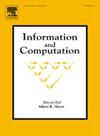通过分级模式会话类型进行非线性交流
IF 1
4区 计算机科学
Q3 COMPUTER SCIENCE, THEORY & METHODS
引用次数: 0
摘要
会话类型为并发行为提供了保证,可以通过它们与线性逻辑的对应关系来理解,将命题作为会话,将证明作为过程。然而,严格的线性是有局限性的,因为存在依赖于非线性行为的有用通信模式。例如,共享信道可以沿着新的线性信道重复产生一个二进制通信进程。分级模态类型是一个包含各种协效(描述计算如何对其上下文提出要求)的框架,可以通过分级模态类型的概念以可控的方式引入非线性。本文展示了分级模态如何与会话类型一起工作,从而精确地重新引入各种非线性并发行为。我们使用 Granule(一种具有线性、索引和分级模态类型的函数式语言)来演示这些想法。我们定义了一个核心微积分,它捕获了必要的特征和我们新的分级基元,然后提出了一个操作模型,并建立了各种关键属性。本文章由计算机程序翻译,如有差异,请以英文原文为准。
Non-linear communication via graded modal session types
Session types provide guarantees about concurrent behaviour and can be understood through their correspondence with linear logic, with propositions as sessions and proofs as processes. However, strict linearity is limiting since there exist useful communication patterns that rely on non-linear behaviours. For example, shared channels can repeatedly spawn a process with binary communication along a fresh linear channel. Non-linearity can be introduced in a controlled way through the concept of graded modal types, which are a framework encompassing various kinds of coeffect (describing how computations make demands on their context). This paper shows how graded modalities can work alongside session types, enabling various non-linear concurrency behaviours to be re-introduced precisely. The ideas are demonstrated using Granule, a functional language with linear, indexed, and graded modal types. We define a core calculus capturing the requisite features and our new graded primitives, then present an operational model and establish various key properties.
求助全文
通过发布文献求助,成功后即可免费获取论文全文。
去求助
来源期刊

Information and Computation
工程技术-计算机:理论方法
CiteScore
2.30
自引率
0.00%
发文量
119
审稿时长
140 days
期刊介绍:
Information and Computation welcomes original papers in all areas of theoretical computer science and computational applications of information theory. Survey articles of exceptional quality will also be considered. Particularly welcome are papers contributing new results in active theoretical areas such as
-Biological computation and computational biology-
Computational complexity-
Computer theorem-proving-
Concurrency and distributed process theory-
Cryptographic theory-
Data base theory-
Decision problems in logic-
Design and analysis of algorithms-
Discrete optimization and mathematical programming-
Inductive inference and learning theory-
Logic & constraint programming-
Program verification & model checking-
Probabilistic & Quantum computation-
Semantics of programming languages-
Symbolic computation, lambda calculus, and rewriting systems-
Types and typechecking
 求助内容:
求助内容: 应助结果提醒方式:
应助结果提醒方式:


